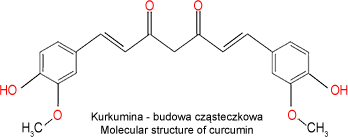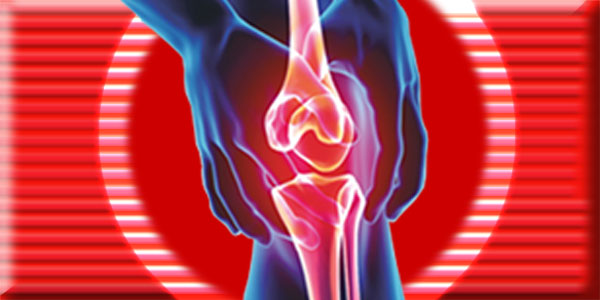Rheumafort+ is a further improvement of our preparation, which has been successfully used for almost 20 years by people who want to take care of healthy and efficient joints. The previous ingredient – lemon fruit extract – has been replaced by a new ingredient turmeric rhizome extract. Turmeric, better known by its Latin name Curcuma longa, is a popular plant belonging to the ginger family growing in the Indian Ocean basin. It is widely used in many areas: as a spice plant (so-called Indian saffron), in cosmetology, as an ornamental plant, as a dyeing plant and finally as a medicinal plant. Turmeric has been used for centuries in Ayurveda*, i.e. traditional Indian medicine.
Turmeric Rhizome
|
Turmeric rhizome is a source of a number of polyphenolic compounds. The most important of them are curcumin, demethoxycurcumin and bisdemethoxycurcumin. In addition, there are several other polyphene compounds. Chemically, curcumin is a diphenylheptanoid belonging to the curcuminoid group. These are phenolic pigments responsible for the yellow color of turmeric. This natural dye marked with the code E100 is used by the food, cosmetics and textile industries. Although the beneficial effects of curcumin have been found in numerous laboratory and clinical experiments, this has not been confirmed in official clinical trials. This may be due to several reasons. Curcumin is unstable in aqueous solutions and is relatively poorly absorbed from the gastrointestinal tract. Pure, isolated curcumin has a worse effect than the complex of active substances obtained from turmeric rhizome. The curcuminoid complex has been shown to have strong antioxidant properties. Testing a substance for pharmaceutical registration requires very large financial outlays, and no large pharmaceutical company has engaged in testing curcumin and/or active compounds from turmeric. |
|
Action of Curcumin
The presented product is a dietary supplement and in accordance with the Food and Nutrition Safety Act and Regulation (EU) No. 1169/2011 of the Parliament and of the Council of 25 October 2011 on the provision of food information to consumers. Foodstuffs cannot be attributed with the property of preventing or curing diseases, nor can any reference be made to such properties. The exception are health claims regarding food and its ingredients that have been approved by EFSA (European Food Safety Agency). In 2016, Suomen Terveysravinto Oy from Finland asked the EFSA for an opinion on a health claim regarding curcumin and the proper functioning of joints. The applicant presented 16 different studies (defined by the EFSA team as human intervention studies) of the effects of curcumin on markers of joint function. EFSA experts considered that the food/ingredient, curcumin, was sufficiently presented. The proposed health claim "providing proper joint function" is a beneficial health effect, but they stated that the relationship between curcumin consumption and ensuring proper joint function was not established in the materials submitted by the applicant.
In its discussion, EFSA said that the applicant had identified 16 human interventions examining the effect of curcumin on 'markers' of joint function. 11 studies were conducted in patients with knee osteoarthritis (Chopra et al., 2004; Kuptniratsaikul et al., 2009, 2014; Belcaro et al., 2010, 2014; Kertia et al., 2012; Pinsornsak and Niempoog, 2012; Madhu et al., 2013; Henrotin et al., 2014; Nakagawa et al., 2014; Panahi et al., 2014), two studies were conducted in patients with osteoarthritis affecting multiple joints (Kulkarni et al., 1991; Appelboom et al., 2014), and two studies were conducted in patients with rheumatoid arthritis (Deodhar et al., 1980; Chandran and Goel, 2012).
References
- Kurbiel A, Kocot-Kępska M, et al Zastosowanie kurkuminy w leczeniu pacjentów z chorobą zwyrodnieniową stawów Praktyczna Ortopedia i Traumatologia 2020, 18
- Srivastava S, Saksena AK, et al Curcuma Longa Extract Reduces Inflammatory and Oxidative Stress Biomarkers in Osteoarthritis of Knee: A Four-Month, Double-Blind, Randomized, Placebo-Controlled Trial Inflammopharmacology 2016 Dec;24(6):377-388. doi: 10.1007/s10787-016-0289-9. Epub 2016 Oct 19.
- Madhu K, Chanda K, Saji MJ: Safety and Efficacy of Curcuma Longa Extract in the Treatment of Painful Knee Osteoarthritis: A Randomized Placebo-Controlled Trial Inflammopharmacology 2013 Apr;21(2):129-36.
- Daily JW, Yang M, Park S.: Efficacy of Turmeric Extracts and Curcumin for Alleviating the Symptoms of Joint Arthritis: A Systematic Review and Meta-Analysis of Randomized Clinical Trials J Med Food 2016 Aug;19(8):717-29.doi: 10.1089/jmf.2016.3705.
- Kuptniratsaikul V. et al.: Efficacy and safety of Curcuma domestica extracts compared with ibuprofen in patients with knee osteoarthritis: a multicenter study, Clin Interv Aging. 2014; 9: 451–458.,Published online 2014 Mar 20. doi: 10.2147/CIA.S58535
- Grover AK and Samson SE: Benefits of antioxidant supplements for knee osteoarthritis: rationale and reality, Nutr J. 2016; 15: 1. Published online 2016 Jan 5. doi: 10.1186/s12937-015-0115-z
- Akhtar N and Haqqi TM: Current nutraceuticals in the management of osteoarthritis: a review, Ther.Adv. Musculoskeletal Dis. 2012, 2: 9, https://doi.org/10.1177/1759720X11436238
- Chopra A et al: A 32-Week Randomized, Placebo-Controlled Clinical Evaluation of RA-11, an Ayurvedic Drug, on Osteoarthritis of the Knees, J. of Clin. Rheumatol: 2004,10(5):236-45, DOI:10.1097/01.rhu.0000138087.47382.6d
- Madhu K et al: Safety and efficacy of Curcuma longa extract in the treatment of painful knee osteoarthritis: a randomized placebocontrolled trial, Inflammopharmacology Experimental and Therapeutic Studies ISSN 0925-4692 Volume 21 Number 2 Inflammopharmacol (2013) 21:129-136, DOI 10.1007/s10787-012-0163-3
- Loprest AL et al: An Investigation into the Effects of a Curcumin Extract (Curcugen®) on Osteoarthritis Pain of the Knee: A Randomised, Double-Blind, Placebo-Controlled Study, Nutrients, 2022, 14(1), 41; https://doi.org/10.3390/nu14010041
- Żęgota Z et al: Efficacy of Herbal and Naturally-Derived Dietary Supplements for the Management of Knee Osteoarthritis: a Mini-review, Wiad.Lek., 2021, 8, 1975-83
- Appelboom T et al.: A New Curcuma Extract (Flexofytol®) in Osteoarthritis: Results from a Belgian Real-Life Experience, Open Rheumatol J. 2014; 8: 77–81.Published online 2014 Oct 17. doi: 10.2174/1874312901408010077
- Perkins K et al.: Efficacy of Curcuma for Treatment of Osteoarthritis, J. Evidence-Based Integrative Med. 2016, 03, https://doi.org/10.1177/2156587216636747
- Nakagawa Y et al.: The Efficacy and Safety of Highly-Bioavailable Curcumin for Treating Knee Osteoarthritis: A 6-Month Open-Labeled Prospective Study, Clin. Med. Insights: Arthritis and Musculoskeletal Dis. 2020, 8, 13: 1–8 https://doi.org/10.1177/1179544120948471







